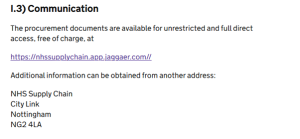Table of Contents
- Why are tender portals used in bidding?
- Commonly used tender portals
- Tips for navigating tender portals
- Check the location for submitting clarification questions
- Verify the process for submitting the bid
- Confirm formatting constraints for quality questions…
- … and the selection questionnaire
- Support with tender portals
Article Details
Tender portals are an unavoidable part of the tender process, and they come in many different formats.
All government notices for contracts above a certain value are advertised on two government tender portals – Find a Tender (around £140,000) and Contracts Finder (over £12,000).
However, these are not the portals you use to access the documents, raise clarification questions and, ultimately, submit the bid. The link to the relevant portal being used by the particular contracting authority will be located under the I.3) Communication section, as illustrated below:

In this blog post, we break down why tender portals are used in the tender process, some common portals you will likely encounter, and what to note when using a tender portal for the first time.
Why are tender portals used in bidding?
Tender portals are used to make the process more open, transparent and efficient. By utilising a centralised portal area, the buyer organisation ensures all bidders have fair, equitable access to the following:
- Updated documents from the original issue of the ITT, should the authority or bidders spot a discrepancy in the tender documents
- Communication to bidders, such as responses to clarification questions which may arise during the tender procedure – remember, these are published anonymously
- The exact time of the submission – although the majority of submissions are due before noon, this can vary from 10am to the end of the working day
- Notifications from the authority, for example an extension to the original submission deadline.
It’s important to note that tender portals often use different ‘builds’ and are supported by different software packages. At times, these can be complex to use and navigate – consequently, it is important to familiarise yourself with different portals to ensure you are confident and capable in submitting a compliant tender.
Commonly used tender portals
As hard copy submissions are almost exclusively a thing of the past and email submissions typically reserved for smaller, below-threshold contracts, navigating tender portals is an essential part of public sector procurement.
When supporting clients with live submissions, our team of bid and tender writers encounter the following tender portals each day:
- Proactis: Hosts hundreds of contracts, framework agreements and dynamic purchasing systems on behalf of dozens of councils, NHS Trusts, and procurement organisations, such as ESPO. Proactis also allows users to search across the entirety of their system, making it easy to identify similar contracts.
- Delta e-Sourcing: a newer entry to the tender portal market, you must have the link to the specific contract notice to express your interest and bid, as Delta does not have search functionality.
- Intend: Similar to Proactis, Intend is used by dozens of different councils and procurement organisations. However, you must typically register an individual account for each buyer organisation, as there is no central platform to search between contracting authorities.
- Public Contracts Scotland: Operated by the devolved Scottish government, Public Contracts Scotland and its sister portal PCS-Tender allow suppliers to search and express interest for all contracts above a value of £50,000.
Typically, you will see a list of different authorities using the associated portal on their website – or, failing that, on the contract notice published on Contracts Finder or Find a Tender.
Tips for navigating tender portals
As portals can vary so widely, we advise investigating and searching different functions of the tender portal at the beginning of the tender process. This will save time towards the end of the bid submission, whilst also ensuring compliance with the authority’s requirements.
Check the location for submitting clarification questions
The process for clarification questions is an important tool in your bid writing kit. Without it, you risk misinterpreting key elements of the bid and losing marks – or worse, being disqualified from the tender process.
Clarification questions occasionally have the option to be made public or responded to privately, but this is not always the case. As good practice, you should be clear and direct regarding the answer you want to obtain, whilst also taking care to ensure the question is anonymised and does not give away too much detail.
Verify the process for submitting the bid
Different tender portals will also have different methods for submission – either requiring you to complete and return documents, sections of the portal, or a mix of both.
It is also crucial to remember that some portals only allow you to click submit once – whereas others will let you submit and then alter or amend your submissions.
Confirm formatting constraints for quality questions…
While the majority of submissions now are document-based, uploading a response document to the relevant section of the portal, some legacy systems are still textboxes. These can impact the formatting of bid responses, and you should note these accordingly – otherwise, you may have the painful task of removing careful formatting, images and graphics.
… and the selection questionnaire
Equally, the selection questionnaire can either be portal-based or document-based. Occasionally, errors in the portal may require you to answer a ‘mandatory’ question which does not require a response – for example, uploading copies of accounts where you have already provided online versions.
By making note of this in advance, you can ensure standardised responses to these questions which satisfy the attachment requirement – avoiding any last-minute rush to submit.
Support with tender portals
Part of our bid and tender writing service includes wider bid management support, extending to managing and checking tender portals for our clients.
Within the service and with your approval, your assigned bid writer will:
- Draft and raise clarification questions in a professional, measured tone, ensuring clarifications are anonymised and you are not giving away any key details of your bid strategy
- Collate and upload documents to the submission area, ensuring everything is uploaded in the correct place
- Complete portal checks of each textbox and submission document, facilitating a complete and compliant bid.
If you would like to know more about the scope of our services, our sales and marketing team are available for a quotation or free, no-obligation consultation at info@executivecompass.co.uk or via telephone 0800 612 5563.
